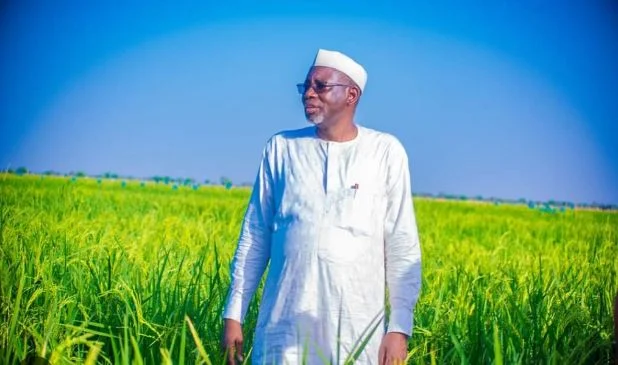Currently, rice is one of the major staples of food consumed in Nigeria, and successive governments at all levels in the country have been introducing different policies and interventions to improve local production of the crop to meet the domestic consumption demands over the years.
Policy inconsistency, corruption, political shenanigans, and parochial sentiment, among other factors, made it impossible to meet the 100 per cent national consumption demands despite the vast arable land and water resources enough to feed Africa with rice.
In Jigawa State, Governor Malam Umar Namadi has demonstrated a determination to lead the drive towards achieving the local demands of rice consumption, and he is doing this by surmounting the challenges. The state’s annual rice output has risen to over 1.6 million.
The achievement was not accidental but a result of projection, determination, and combined efforts of government, farmers and other stakeholders bound upon trust, confidence and sincere commitment from both sides.
As a deputy governor and commissioner of finance under the immediate past state administration, Malam Namadi was at the forefront of championing the Cluster Farming programme with the slogan “Farming As Business.” It was, therefore, not surprising that upon the assumption of office, the Jigawa Governor is sustaining the tempo.
Of course, this initiative laid the foundation for Jigawa’s emergence as one of the leading rice-producing states in Nigeria, with an annual production of over 1.6 million tonnes.
Today, Jigawa State, one of the major rice-producing states in Nigeria, is also leading the charge in boosting business with more value chains.
Although the journey to making Jigawa the leader in rice production started in 2011 because of a series of federal and state government policies and interventions, the development became more popular in 2017 with the introduction of “Cluster Farming”
But importantly, the current administration’s sustenance has encouraged many young men to venture into farming, as many modern farming techniques, improved seeds, and modern farm inputs have been made available and accessible.
In addition, the Governor Namadi administration introduced a program known as ” Rice Millionaires,” in which the government gives soft loans to young men who venture into rice farming for business. Under this scheme, over N3 billion was approved as agricultural loans to civil servants.
The provision of such facilities contributed to the increased rice outputs and yield from an average of 2.4 tonnes to 6.76 tonnes per hectare with some clusters reaching as high as 8.2 tonnes.
The dramatic increase in rice production in the state was possible because the state government provided all the necessary incentives, including embracing dry-season rice farming.
Jigawa state is now a rice field with farms spread across every nook and cranny of the state.
During an inspection visit to some rice farms along Hadeja Valley in Ringim, Taura, Auyo and Hadejia local government area of the state, Governor Namadi declared that his government has succeeded in supporting farmers to cultivate over 200,000 hectares of Rice and expected to harvest over 800,000 metric tonnes.
According to him, they were targeted to produce 800,000 metric tonnes in the dry season and hope to produce similar amounts in the rainy season. That means Jigawa hopes to produce 1,600,000 metric tonnes, equivalent to 27 per cent of the annual rice needed in Nigeria.
Interestingly, Jigawa rice farmers had a bumper harvest, and it was estimated that the state exceeded its target of 800,000 tonnes despite the flooding disaster.
The booming rice production in Jigawa state has led to the springing up of major, medium, and mini rice milling plants, which equally provide more job opportunities with a value chain.
According to statistics from the state ministry of commerce, over 400 mini and medium milling machines operate in the state.
Some of the major Rice Mills in the state include Three Brothers’ Jigawa Rice, which has a milling capacity of 120,000 tonnes per annum, and Majestic Rice, which has a milling capacity of 60,000 tonnes per annum.
The Dangote Rice Mills, with a capacity of 280,000 tonnes per annum, is currently under construction in the Kaugama local government of the state, and the work has reached over 80 per cent completion.
Adamu Maigora Haruna is the chairman of Rice Farmers Association of Nigeria (RIFAN). He said the state government’s focus on Rice production has positioned Jigawa to provide not just the rice needs of the north but the entire country “if the sector continues to receive the required support and intervention”.
Good enough, in his enthusiasm to ensure continuous improvement and sustainable growth in rice production and agricultural sector of the state, Governor Namadi introduced new policy of “Agricultural Mechanisation” where N26billion had been earmarked for the purchase of 300 Tractors, 300 Disc plough, 300 Disc Harrow, 300 Disc Ridger, 300 Tipping Trailer ,150 Multipurpose Planter, 150 Rice Seeder, 40 Combined Harvester and 80 Boom Sprayer.
“The contract for the procurement of the implements has been signed and before the end of December 2024 the state will take the delivery for onwards distribution to the constituencies” Governor Namadi’s media aide, has said.
As part of this drive, sixty mechanization service centres have been established with two centers in each of the 30 state constituencies for continues training of manpower to meet the demands of the state’s mechanisation and industrialisation project.
Government is also sponsored 30 graduates mostly, Agric Engineers, for three-month training in China.
In a farewell speech to them ahead of their departure to China, Governor Namadi described them as one of the main pillars for driving the state Agric Mechanisation Policy which was pivot to sustainable agricultural growth in the state.
Interestingly, plans are to ensure massive conversion of petroleum/diesel water pumps to CNG at the designated centres and supply solar-powered generators to enhance dry-season farming.
With these plausible initiatives, Jigawa state is on the path to achieving sustainable agricultural growth, poverty eradication, food sufficiency and building local resilient economy.
We’ve got the edge. Get real-time reports, breaking scoops, and exclusive angles delivered straight to your phone. Don’t settle for stale news. Join LEADERSHIP NEWS on WhatsApp for 24/7 updates →
Join Our WhatsApp Channel










